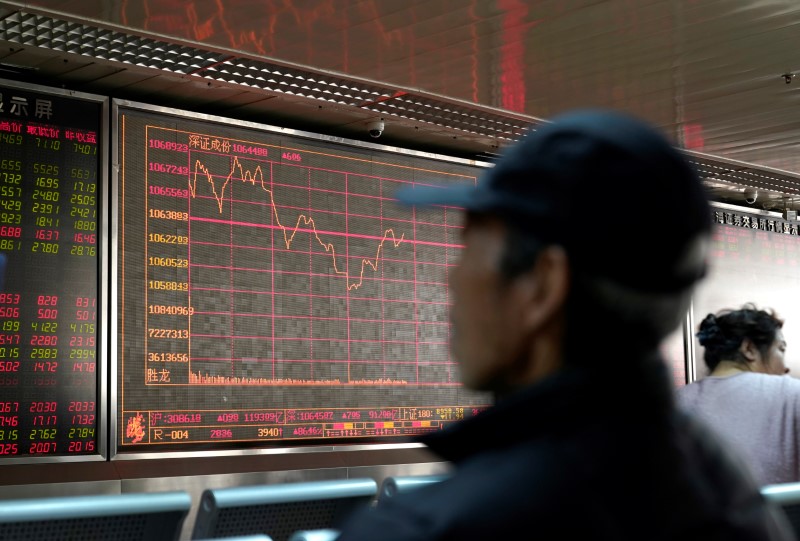By Stanley White
TOKYO (Reuters) - Asian shares tumbled on Thursday, led by the biggest slide in Chinese stocks in more than eight months, as investors grew more anxious about the spread of a new flu-like virus in China just as millions prepared to travel for the Lunar New Year.
The likely hit to airline travel from the contagion sent oil futures skidding to seven-week lows, while the International Energy Agency's warning of an oil surplus and a larger-than-expected increase in U.S. crude inventories re-kindled fears of excess supply.
MSCI's broadest index of Asia-Pacific shares outside Japan (MIAPJ0000PUS) fell 1.07%.
Chinese shares (CSI300) suffered a steep 3.04% loss, on course for their biggest daily decline since May 6, 2019, when U.S. President Donald Trump's threats of additional tariffs on Chinese goods roiled financial markets.
Shares in Hong Kong (HSI) also took a beating, down 1.91%, while Japan's Nikkei stock index (N225) slid 0.99%.
Euro Stoxx 50 futures (STXEc1) were down 0.4%, suggesting European shares are also heading into a rough trading session.
The Chinese yuan fell to a two-week low, while safe-havens such as the Japanese yen, gold, and U.S. Treasuries rose as a travel blockade of the Chinese city Wuhan, the epicenter of the outbreak, started earlier on Thursday.
Deaths in China from the new coronavirus rose to 17 on Wednesday, with nearly 600 cases confirmed. The outbreak has evoked memories of Severe Acute Respiratory Syndrome (SARS) in 2002-2003, another coronavirus which broke out in China and killed nearly 800 people in a global pandemic.
"Markets are expressing concern about the growth outlook," said Michael McCarthy, chief market strategist at CMC Markets in Sydney.
"The coronavirus has introduced some caution. There is no reason to expect a global pandemic now, but there is some repricing in financial markets."
U.S. stock futures (ESc1) fell 0.2% on Thursday in Asia.
The S&P 500 (SPX) eked out a 0.03% gain on Wednesday, but the overall tone on Wall Street was mixed as investors assessed the impact of the virus and braced for the corporate earnings season.
Cases have been detected in Beijing, Shanghai, Macau, Hong Kong, Japan, and the United States. China put Wuhan, a city of 11 million people, on lockdown earlier on Thursday by closing public transportation hubs and suspending outgoing flights.
However, there are fears the virus could spread rapidly, because millions of Chinese travel domestically and abroad during the week-long Lunar New Year holidays, which start on Friday.
Air China (SS:601111), China's flagship carrier, skidded 4.06% to the lowest in nine weeks. Shares of Australia's Qantas Airways Ltd (AX:QAN) fell 1.77%, while Japan Airlines Co (T:9201) dropped 1.82% and rival air carrier ANA Holdings Inc (T:9202) declined 1.84%.
In the onshore market, the yuan
The yen
Gold
The yield on benchmark 10-year Treasury notes (US10YT=RR) fell to 1.7482% in Asia as some investors sought the safety of government debt.
U.S. crude (CLc1) fell 1.78% to $55.73 a barrel, touching the lowest since Dec. 3. Brent crude (LCOc1) slumped by 1.52% to $62.25 per barrel to reach the lowest since Dec. 4.
The American Petroleum Institute said U.S. crude inventories rose 1.6 million barrels last week, compared with analysts' expectations for 1 million-barrel draw.
Markets took Trump's impeachment trial in stride, as he is widely expected to be acquitted in the Republican-controlled Senate.
Democrats accused Trump at the start of his impeachment trial on Wednesday of a corrupt scheme to pressure Ukraine to help him get re-elected.

Trump told reporters in Switzerland the Democrats did not have enough evidence to find him guilty and remove him from office.